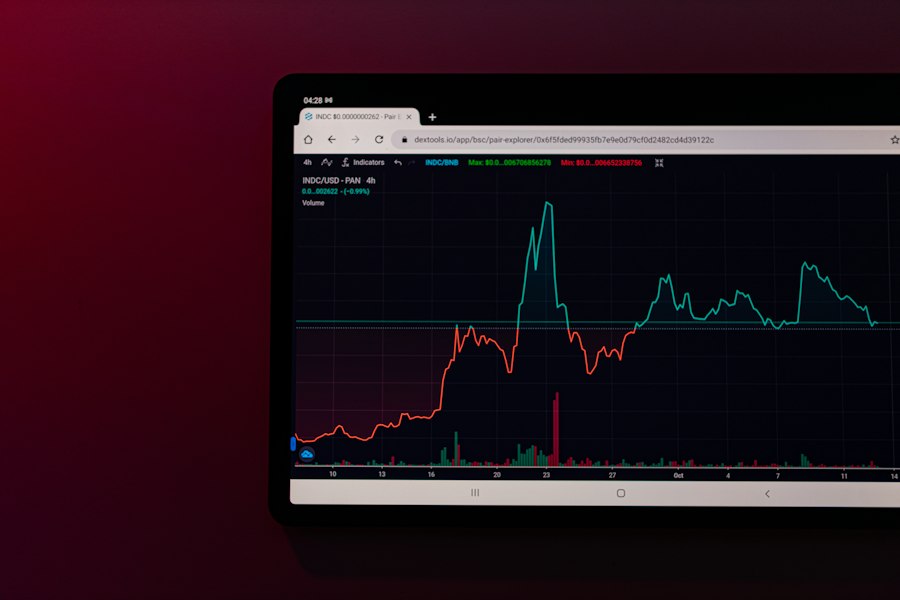Blockchain technology has gained significant attention in recent years due to its potential to revolutionize various industries, including marketing technology (MarTech). At its core, blockchain is a decentralized and distributed ledger that records transactions across multiple computers. This technology offers several advantages, such as enhanced security, transparency, and trust. In the context of MarTech, blockchain can be used to improve data security, enable trust and transparency, streamline processes through smart contracts, revolutionize digital advertising, enhance customer data privacy, and more.
Key Takeaways
- Blockchain technology is a decentralized, secure and transparent way of storing data.
- Blockchain can improve data security in MarTech by providing a tamper-proof and immutable ledger.
- Blockchain enables trust and transparency in MarTech by allowing all parties to access and verify data.
- Smart contracts can automate processes and reduce costs in MarTech by eliminating intermediaries.
- Blockchain has the potential to revolutionize digital advertising by providing a more efficient and transparent way of tracking ad spend.
Blockchain’s Impact on Data Security in MarTech
Data security is a critical concern in the MarTech industry, as companies handle vast amounts of sensitive customer information. Blockchain technology can enhance data security by providing a decentralized and tamper-proof system for storing and managing data. Unlike traditional centralized databases, where a single point of failure can compromise the entire system, blockchain distributes data across multiple nodes, making it extremely difficult for hackers to manipulate or corrupt the data.
Several companies have already started leveraging blockchain for data security in MarTech. For example, AdEx is a decentralized advertising platform that uses blockchain to ensure transparency and prevent fraud in digital advertising. By storing ad impressions and clicks on the blockchain, AdEx eliminates the need for intermediaries and provides advertisers with verifiable data.
How Blockchain Enables Trust and Transparency in MarTech
Trust and transparency are crucial elements in the MarTech industry, as they help build strong relationships between businesses and their customers. Blockchain technology can improve trust and transparency by providing an immutable record of transactions that can be accessed by all parties involved. This eliminates the need for intermediaries and reduces the risk of fraud or manipulation.
One example of a company using blockchain for trust and transparency in MarTech is Provenance. Provenance is a platform that uses blockchain to track and verify the origin and authenticity of products. By recording every step of a product’s journey on the blockchain, Provenance enables consumers to make informed purchasing decisions and ensures that businesses are held accountable for their claims.
The Role of Smart Contracts in MarTech
Smart contracts are self-executing contracts with the terms of the agreement directly written into code. These contracts automatically execute when certain conditions are met, eliminating the need for intermediaries and reducing the risk of fraud or human error. In the context of MarTech, smart contracts can streamline processes and improve efficiency.
Several companies have already started using smart contracts in MarTech. For example, OpenBazaar is a decentralized marketplace that uses smart contracts to facilitate peer-to-peer transactions. By automating the buying and selling process, OpenBazaar eliminates the need for intermediaries and reduces transaction costs.
Blockchain’s Potential to Revolutionize Digital Advertising
Digital advertising is another area where blockchain technology can have a significant impact. The current digital advertising ecosystem is plagued by issues such as ad fraud, lack of transparency, and inefficient targeting. Blockchain can address these challenges by providing a transparent and verifiable system for tracking ad impressions, clicks, and conversions.
Brave is a web browser that uses blockchain to revolutionize digital advertising. Brave blocks unwanted ads by default and allows users to opt-in to view privacy-respecting ads in exchange for rewards. By using blockchain technology, Brave ensures that advertisers only pay for verified ad views and provides users with control over their data.
Blockchain’s Role in Improving Customer Data Privacy in MarTech

Customer data privacy is a growing concern in the MarTech industry, as consumers become more aware of how their data is being collected and used. Blockchain technology can enhance customer data privacy by providing a secure and transparent system for storing and managing personal information.
One example of a company using blockchain for customer data privacy in MarTech is Datum. Datum is a decentralized data marketplace that allows users to store and sell their personal data securely. By using blockchain technology, Datum ensures that users have full control over their data and can choose who has access to it.
Use Cases for Blockchain in MarTech
The potential use cases for blockchain in MarTech are vast and varied. Some of the most promising applications include supply chain management, loyalty programs, content licensing, identity verification, and more.
For example, VeChain is a blockchain platform that focuses on supply chain management. By recording every step of a product’s journey on the blockchain, VeChain enables businesses and consumers to verify the authenticity and quality of products.
Challenges and Limitations of Implementing Blockchain in MarTech
While blockchain technology holds great promise for the MarTech industry, there are several challenges and limitations that need to be addressed. One of the main challenges is scalability, as blockchain networks can become slow and inefficient when handling a large number of transactions. Additionally, there are regulatory and legal challenges surrounding the use of blockchain in certain industries.
One example of a company facing challenges in implementing blockchain in MarTech is Kodak. In 2018, Kodak announced the launch of its own blockchain platform for digital rights management. However, the project faced criticism and legal issues, ultimately leading to its failure.
The Future of Blockchain and MarTech Collaboration
The collaboration between blockchain and MarTech is still in its early stages, but the potential for innovation and disruption is immense. As blockchain technology continues to evolve and mature, we can expect to see more companies exploring its applications in MarTech.
One emerging trend in blockchain and MarTech collaboration is the use of non-fungible tokens (NFTs) for digital assets. NFTs are unique digital tokens that can represent ownership or proof of authenticity for digital assets such as artwork, music, or collectibles. This opens up new possibilities for artists and creators to monetize their work and engage with their audience.
The Importance of Blockchain in Building Trust and Transparency in MarTech
In conclusion, blockchain technology has the potential to revolutionize the MarTech industry by enhancing data security, enabling trust and transparency, streamlining processes through smart contracts, revolutionizing digital advertising, enhancing customer data privacy, and more. While there are challenges and limitations to overcome, the collaboration between blockchain and MarTech holds great promise for building a more secure, efficient, and transparent marketing ecosystem. As the industry continues to evolve, it is crucial for businesses to embrace blockchain technology and leverage its potential to build trust and transparency with their customers.
If you’re interested in exploring the role of blockchain in MarTech further, you might find this article from Martech.com.my to be a valuable resource. Titled “Blockchain Technology: Revolutionizing the Marketing Landscape,” it delves into how blockchain is transforming the marketing industry by enhancing trust and transparency. To gain deeper insights into this exciting intersection of technology and marketing, click here to read the full article.
FAQs
What is MarTech?
MarTech is a combination of marketing and technology that refers to the tools and strategies used by businesses to promote their products or services.
What is blockchain?
Blockchain is a decentralized digital ledger that records transactions in a secure and transparent manner. It is a technology that allows for secure and tamper-proof data storage and transfer.
How can blockchain be used in MarTech?
Blockchain can be used in MarTech to build trust and transparency in marketing campaigns. It can be used to verify the authenticity of data, prevent fraud, and ensure that data is not tampered with.
What are the benefits of using blockchain in MarTech?
The benefits of using blockchain in MarTech include increased transparency, improved security, reduced fraud, and increased trust between businesses and consumers.
What are some examples of how blockchain is being used in MarTech?
Some examples of how blockchain is being used in MarTech include verifying the authenticity of influencer marketing campaigns, tracking the provenance of products, and ensuring the accuracy of customer data.
Is blockchain technology widely adopted in MarTech?
Blockchain technology is still in the early stages of adoption in MarTech, but it is gaining traction as more businesses recognize its potential to improve transparency and trust in marketing campaigns.

